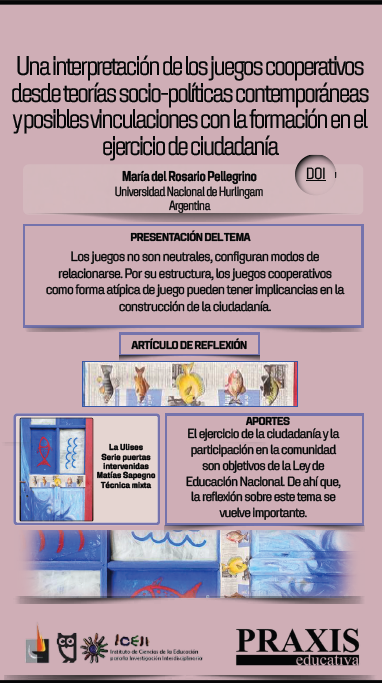An interpretation of cooperative games from contemporary socio-political theories and possible connections with the formation in the exercise of citizenship
DOI:
https://doi.org/10.19137/praxiseducativa-2025-290212Keywords:
jugar, juego educativo, Política cultural, ciudadanía, comunidadAbstract
The ways of playing are not neutral; they shape subjectivities and modes of relating. Play and playing participate in power struggles. While some types of play align with hegemonic interests due to their structure, cooperative play offers an alternative framework based on participation and horizontal collaboration in solving common challenges. Therefore, this type of play constitutes an exercise in direct democracy that promises a new horizon for the era. However, given its marginalized status compared to other forms of play, it is necessary to create spaces for practicing this type of play, which in turn allows for investigating its social and political implications.
Downloads

Published
Issue
Section
License
Copyright (c) 2025 Maria del Rosario Pellegrino

This work is licensed under a Creative Commons Attribution-NonCommercial-ShareAlike 4.0 International License.
Copyright Notice
Editorial Committee Educational Praxis Magazine:
I hereby declare that I am the author of the article titled (article name), that it is original and my own and that it was not previously published in any other format or medium. I declare to know that the magazine will not charge me any type of fee under any circumstances, nor will I receive any type of monetary compensation If it were accepted for publication in Educational Praxis, I authorize the aforementioned magazine to publish it digitally and to advertise it on its social networks.
If the work is published, I adhere to the Creative Commons license called "Attribution - Non-Commercial Share Alike CC BY-NC-SA", through which it is allowed to copy, reproduce, distribute, publicly communicate the work and generate derivative works, as long as when the original author is cited and acknowledged. This license has been used since September 2018. In 2016 CC BY NC ND 4.0 was adhered to; and in the years 2017 and 2018 (January-August) CC BY NC 4.0.
This CC BY-NC-SA Share Alike license does not, however, permit commercial use of the work. As an author, the journal may establish additional agreements for the non-exclusive distribution of the version of the work published in the journal, it allows me to self-archive the published articles, in their post-print version, in institutional, thematic repositories, personal web pages or any other relevant use. with the recognition of having been first published in this journal.
Educational Praxis adheres to DORA (Declaration on Research Assessment) signed in San Francisco, California, on December 16, 2012, and to the Declaration of Mexico (Joint Declaration LATINDEX - REDALYC - CLACSO - IBICT).














_(1)2.png)


3.png)











_(2).png)






2.jpg)









